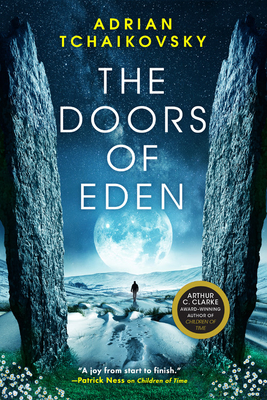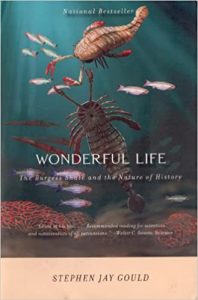 The Doors of Eden by Adrian Tchaikovsky
The Doors of Eden by Adrian Tchaikovsky Format: audiobook, eARC
Source: purchased from Audible, supplied by publisher via Edelweiss
Formats available: hardcover, paperback, ebook, audiobook
Genres: alternate history, espionage, science fiction
Pages: 640
Published by Orbit on September 22, 2020
Purchasing Info: Author's Website, Publisher's Website, Amazon, Barnes & Noble, Kobo, Bookshop.org
Goodreads
From the Arthur C. Clarke Award-winning Adrian Tchaikovsky, The Doors of Eden is an extraordinary feat of the imagination and a page-turning adventure about parallel universes and the monsters that they hide.They thought we were safe. They were wrong.Four years ago, two girls went looking for monsters on Bodmin Moor. Only one came back.Lee thought she'd lost Mal, but now she's miraculously returned. But what happened that day on the moors? And where has she been all this time? Mal's reappearance hasn't gone unnoticed by MI5 officers either, and Lee isn't the only one with questions.Julian Sabreur is investigating an attack on top physicist Kay Amal Khan. This leads Julian to clash with agents of an unknown power - and they may or may not be human. His only clue is grainy footage, showing a woman who supposedly died on Bodmin Moor.Dr Khan's research was theoretical; then she found cracks between our world and parallel Earths. Now these cracks are widening, revealing extraordinary creatures. And as the doors crash open, anything could come through."Tchaikovsky weaves a masterful tale... a suspenseful joyride through the multiverse." (Booklist)
My Review:
 Spy games, cryptids (Sasquatch, Yetis and Loch Ness Monsters, OH MY!) with a nod to Stephen Jay Gould’s Wonderful Life. PLUS a bit of Doctor Who – at least in the audiobook. These are things that absolutely should not go together, but somehow do anyway in The Doors of Eden.
Spy games, cryptids (Sasquatch, Yetis and Loch Ness Monsters, OH MY!) with a nod to Stephen Jay Gould’s Wonderful Life. PLUS a bit of Doctor Who – at least in the audiobook. These are things that absolutely should not go together, but somehow do anyway in The Doors of Eden.
It’s really all about the butterfly. You know the one. That hypothetical butterfly who flaps its wings on one side of the world and causes a tornado on the other.
Only in this case there are perhaps thousands, or even millions of butterflies, each flapping their wings on a slightly different version of our Earth. Or, to put it another way, “the problem with wanting things to change is that things change.” Sometimes by quite a lot and not necessarily for the better.
Depending on who, or what, is defining better, along with who, what or why the change is happening at all.
It all begins with two young women out on Bodmin Moor hunting cryptids. Let’s unpack that a bit. Lee and Mal are childhood best friends who are now in college. Their intense relationship has shifted from friends to lovers over the years they’ve been together. They’re on holiday, between semesters, doing what they do when they’re together. They’re somewhere creepy, looking but not expecting to find something even creepier. And possibly mythical or magical, or maybe even both.
It seems like their cryptid hunting (cryptids are animals whose existence is unsubstantiated, like Bigfoot, or Nessie) is mostly a manifestation of their shared nerdiness. Their admission that they are both a bit weird and might as well embrace the identity they’re going to have to live with anyway.
Neither of them believes that they are EVER going to find real evidence of cryptids. They’re just having fun looking. That is, until the cryptids, or at least one set of cryptids, find them.
And take Mal away to a place that Lee can’t follow, no matter how much she wants to. When Mal returns four years later, she brings the entire rest of this story with her, the spies, the cryptids, the criminal masterminds – and entirely too many signs and portents of the end of the world, not just as we know it, but the impending extinction of all the Earths in all of the multiverse.
Along with one single, one in a billion chance of saving them all.
Escape Rating A+: There was SO MUCH going on in this book. It went to so many fascinating places, dragged in so many interesting possibilities and ended with such a marvelous bang that it’s still an A+ story in my book even if the spies did faff around a bit in the middle.
On the other hand, anyone would flail a bit at all the strange and bizarre things going on in this absolute WOW of a story.
The elements that go into this absolutely should not work together, and yet they oh so very much do. To the point where, although I started out listening to this one – and it is an excellent listen – I got impatient with needing to know how it all managed to get itself together at the end and switched to the ebook just so I could figure things out.
But the audio is where I thought two of those disparate elements came into the mix, although in the end it turned out to be only one.
The reader of the audio is Sophie Aldred, who played Ace on Doctor Who many, many moons ago, when Sylvester McCoy was the Seventh Doctor. Although, now that I think of it, the way that the parallel worlds work in The Doors of Eden could be said to have its own parallels in Who.
But I digress.
The other element that I thought came from the audio was the resemblance to Stephen Jay Gould’s Wonderful Life, his fascinating and eminently readable book about the Burgess Shale. I listened to that book a LONG time ago, but it stuck with me. And it seemed like the tone of that reading was echoed in The Doors of Eden in the interstitial parts where Dr. Ruth Emerson’s treatise on “Other Edens” is read. Her work on alternate Earths had the same tone as Wonderful Life. I thought it was a coincidence, but it’s not. Wonderful Life is cited by the author as one of the inspirations for The Doors of Eden, and now that I know that it’s obvious that at least part of what it inspired was these sections of the story.
Which leads us to the story itself.
The action and the dramatic tension in this story come from Mal’s return to our own Earth, the mess that return makes of Lee’s life, and the reason for that return in the grand scheme of things.
After all, no matter how much Mal wants to return to her lover, the reason that the Nissa, just one of the so-called cryptids, bring Mal back to the Earth she calls home is a whole lot bigger and vastly more important. Mal is there to rescue mathematician and physicists Dr. Kay Amal Khan so that she can help them save ALL the Earths.
But just as Mal’s friends want to save all the Earths, there are forces that want to, not exactly prevent the rescue, but let’s say, direct that rescue. There’s a criminal mastermind who has, naturally enough, criminal plans. And there are government agencies, in this case MI5, who are tasked with protecting Kay Amal Khan from anyone who wants to either do her harm or co-opt her genius for their own purposes.
That’s where the spy games, in the persons of Julian Sabreur and Alison Matchell come in. Only to find themselves caught up in trying to save the worlds, which is way above both of their official pay grades – even if it’s all still subject to the Official Secrets Act..
There’s a saying that “Mother Nature bats last.” The quote from environmentalist Rob Watson in full goes like this:
Mother Nature is just chemistry, biology and physics. That’s all she is.” You cannot sweet-talk her. You cannot spin her. You cannot tell her that the oil companies say climate change is a hoax. No, Mother Nature is going to do whatever chemistry, biology and physics dictate, and “Mother Nature always bats last, and she always bats 1.000.
In short, that’s what this story is about, Mother Nature batting last. For select versions of Mother Nature, where she’s really a supercomputer bigger than a planet who has been trying for eons to find a way for her last “at bat” to not kill off all of everything everywhere.
Well, not exactly that either. Mother Nature doesn’t care, as the quote says so succinctly. But in this story that supercomputer does. It’s trying to help the beings on various versions of Earth, of which it is one of the few, who have developed enough sentience to not only figure out that the end is coming, but who are working to prevent it.
Which drags in Dr. Khan, and all kinds of cryptids, including the Nissa and the rat people, and Lee and Mal and the spies and the criminal masterminds. This is a story whose plot boils and bubbles – and occasionally squeaks – until the very end.
Until it ends with an almighty bang, as well as a whole lot of whimpering on the part of many of the characters, who are left with a story that they can never, ever tell and the chance to live a life much bigger than the one they thought they had to settle for.
Unless and until Mother Nature comes to bat again. Unless she already has.






















One thought on “Review: The Doors of Eden by Adrian Tchaikovsky”
Comments are closed.